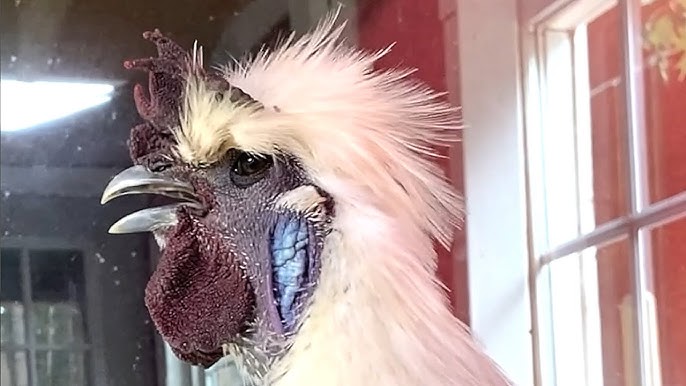The Cock Who Lost His Voice: A Parable on Conformity, Courage, and the Cost of Compromise
By: Javid Amin | Srinagar | 22 June 2025
In a village nestled between rolling hills and whispering streams, where time moved with the languid pace of ripening fruit, lived a man named Elias. Elias possessed a treasure: a magnificent rooster named Kavi. Kavi wasn’t merely poultry; he was a feathered symphony of life. His plumage shimmered like captured sunlight – iridescent greens, deep burnished reds, and golds that flashed with every proud step. His comb stood tall and crimson, a regal crown. His strut across the sun-dappled courtyard was pure, unadulterated confidence, a declaration of his place in the world. And then, there was his voice. When Kavi greeted the dawn, it wasn’t just a crow; it was a clarion call, a resonant, earth-shaking proclamation that sliced through the pre-dawn mist and roused every slumbering soul for miles. It was the village’s alarm clock, its heartbeat, a sound woven into the very fabric of their existence.
Elias admired Kavi, truly. He bestowed upon him the finest grains, scattered like jewels. Kavi roamed freely, a feathered sovereign surveying his domain. Yet, beneath this veneer of care, a darker craving simmered within Elias. On cold evenings, the aroma of rich, spicy chicken curry haunted his thoughts – a deep, primal longing for warmth and sustenance. The dissonance was palpable. How could he transform this vibrant creature, this living artwork, this herald of the sun, into mere meat? The act felt brutal, a violation of the bond, however pragmatic, that existed. Elias wasn’t a cruel man inherently; he was a conflicted one. So, he chose not honesty, but cunning. He sought justification, a way to shift the moral burden from his own shoulders onto Kavi’s.
The First Ultimatum: Silencing the Symphony
One crisp morning, after Kavi’s particularly magnificent salutation to the rising sun, Elias approached. His expression was a mask of strained patience, a carefully constructed blend of affection and annoyance. “Kavi,” he began, his voice a honeyed trap, “your dawn chorus… while magnificent, my friend, it has become… disruptive. The neighbors murmur. My own rest suffers. Such volume! From tomorrow, you must silence that magnificent voice. Not a single crow at dawn. Keep that noble beak firmly shut.” He paused, letting the weight of the demand settle, then added the velvet-gloved threat: “Fail me in this, and I fear our journey together ends in the biryani pot. A glorious end for a glorious bird, perhaps, but an end nonetheless.”
Kavi, perched on his favorite weathered fence post, felt his vibrant feathers prickle. The threat was absurd! Crowing was his essence, his purpose, his very nature! Yet, the glint in Elias’s eyes held no jest. Survival instinct, cold and sharp, surged through him. Appease. Adapt. Survive. The next morning, as the first pale fingers of light stretched across the sky, Kavi took his perch. The ancient urge to unleash his clarion call surged within his breast. He drew breath, opened his beak… and stopped. Silence. Utter, unnatural silence. Instead, driven by a desperate, suppressed energy, he performed a series of sharp, exaggerated wing flaps. Flap-flap-flap! It was a silent scream, a frantic dance of feathers against the quiet dawn – the spirit of the crow expressed through frantic motion, a dancer robbed of his music but clinging to movement.
Moving the Goalposts: The Flutter Becomes the Fault
Elias observed this pantomime. Later that day, he summoned Kavi again. This time, the mask of patience was thinner. “Ah, Kavi!” Elias exclaimed, his voice dripping with false admiration and thinly veiled irritation. “So clever! You think to replace one annoyance with another? Those dramatic wing flaps – flap-flap-flap – shaking the very dust from the rafters! It’s worse than the crowing! Do you mock me? Very well. Tomorrow: absolute stillness. No sound, and no fluttering. Not a whisper, not a tremor.” The honey was gone, replaced by vinegar. “Choose your end: boiled plain, fried crisp, or roasted golden. The choice, my noisy friend, is yours.” The justification shifted seamlessly. The problem was no longer the crow; it was Kavi’s existence expressing itself in any form.
Kavi’s heart hammered against his ribs like a trapped bird. Fear, cold and pervasive, washed over him. The rules had changed beneath his feet. Yesterday, silence was the price of survival. Today, even silent expression was treason. Survival mode locked in. Absolute stillness. The next dawn arrived. Kavi ascended his perch, a statue carved from fear. He locked every muscle. He didn’t draw the deep breath needed for a crow. He didn’t twitch a single flight feather. He became a monument to suppression, eyes wide, fixed on the horizon as the sun painted the sky. He didn’t even allow himself a sneeze. He poured every ounce of his being into becoming nothing, a void, hoping emptiness would grant him another day.
The Impossible Demand: When Appeasement Meets Absurdity
Elias watched the motionless rooster, a flicker of something unreadable in his eyes – perhaps triumph, perhaps guilt swiftly buried. On the third day, he approached Kavi once more. This time, his smile was different – wide, almost theatrical, chilling in its absurdity. “Kavi, my dear, silent statue!” Elias announced, clapping his hands softly. “I’ve had a change of heart. A brilliant idea! Your discipline is admirable. Such control! So, tomorrow… I require an egg. A fine, large, fresh egg. Place it right here by sunrise.” He pointed to a spot on the dusty ground. “Do this, and your place here is secure. Fail…” He let the threat hang, heavy and familiar, in the air. “…and well, you know the alternatives. Perhaps a rich curry this time?”
Kavi stared. An egg? The sheer, breathtaking impossibility of the demand struck him dumb. He was Kavi! Rooster! Herald of the Dawn! Possessor of Spurs and Comb, not ovaries! The biological reality was absolute, unchangeable. In that moment, the fragile scaffolding of his appeasement crumbled. He understood with devastating clarity the game Elias played. It was never about the crow, or the flutter, or the stillness. It was about control. It was about Elias manufacturing excuses to alleviate his own guilt about his desire. No matter how completely Kavi contorted himself, erased his nature, silenced his soul, the demand would escalate until it reached the utterly impossible. His existence itself was the provocation. Compliance only invited a crueler, more absurd test.
The Anatomy of a Soul-Crushing Dynamic: Beyond the Fable
This seemingly simple village tale resonates with profound, unsettling truth about toxic dynamics found everywhere:
-
The Shifting Justification: The aggressor (Elias) never fixes the real issue (his desire for curry/control). Instead, they attack the expression of the victim’s (Kavi’s) core being. When one expression is suppressed, they target the next natural reaction or even mere existence. The goalpost moves perpetually, making true compliance impossible and keeping the victim off-balance.
-
The Manufactured Crisis: Each “demand” is arbitrary and designed to fail eventually. It creates a perpetual state of crisis where the victim is always scrambling to avoid punishment, exhausting their resources (emotional, physical, spiritual) in a futile race.
-
The Impossibility Tax: This is the ultimate cost. The victim pays first with their voice (the crow), then their secondary expressions (the flutter), then their very stillness and presence. Finally, they are asked for something fundamentally against their nature (laying an egg). The “tax” is the progressive surrender of identity, dignity, and truth for the fleeting illusion of safety. The safety is always illusory.
-
The Illusion of Choice: “Boiled, fried, or roasted?” offers a veneer of control, but the core choice – annihilation – remains unchanged. It’s a cruel parody of agency.
-
The Burden of Guilt Shift: Elias, unable to own his destructive desire, makes Kavi responsible for provoking it through his very existence. “If only you weren’t so loud/flappy/existent, I wouldn’t have to destroy you.”
Modern Echoes of Kavi’s Plight:
Kavi’s story isn’t confined to a rustic village. It plays out in hauntingly familiar ways:
-
The Workplace: The employee whose initially praised “passion” (their crow) is later labeled “disruptive.” When they become quietly diligent (stillness), they’re criticized for lack of initiative. Finally, they’re tasked with an impossible project (the egg) – setting them up for failure and justifying dismissal. “They just couldn’t deliver.”
-
Toxic Relationships: The partner who first demands you stop seeing certain friends (silencing your crow), then complains you’re “too clingy” or “too distant” when you adjust (the flutter or stillness). Ultimately, they demand you fundamentally change your personality, values, or life goals (lay an egg) to prove your love, knowing it’s impossible.
-
Societal Pressures: Marginalized groups constantly told to assimilate, tone down their culture (silence their crow), then criticized for being “too quiet” or not participating (stillness), and finally blamed for not solving systemic problems they didn’t create (laying the egg).
-
Personal Boundaries: Constantly yielding “just this once” to demands from family or friends, only to find the demands escalate (moving goalposts) until you’re sacrificing your core needs, health, or values (paying the Impossibility Tax).
Breaking Free: Refusing the Egg-Laying Mandate
Kavi’s tragic arc offers the clearest warning: Appeasement does not guarantee safety; it often invites greater demands. How do we avoid Kavi’s fate?
-
Recognize the Pattern Early: Identify the shifting justifications and moving goalposts. Is the complaint truly about a specific behavior, or is it about your presence or nature? When demands escalate after compliance, sound the alarm.
-
Name the Impossibility: Call out the absurd demand. “I understand you want an egg, but I am a rooster. It is biologically impossible for me to lay one.” Refuse to engage with the premise as if it were reasonable.
-
Reclaim Your Voice (Wisely): This doesn’t always mean loud confrontation (though sometimes it does). It means asserting your reality, your boundaries, and your fundamental nature. “My crow is who I am. It is not negotiable.” Or, “Constant stillness is not sustainable or healthy for me.”
-
Refuse to Internalize the Guilt: Understand the aggressor’s guilt is theirs to bear, not yours to absolve by destroying yourself. You are not responsible for their unreasonable desires or justifications.
-
Assess True Safety: If compliance only leads to escalating demands and the threat of destruction remains constant, true safety lies outside the dynamic. Sometimes, the only winning move is to leave the courtyard. Find a coop where crowing is celebrated.
-
Build Your Flock: Surround yourself with those who appreciate your authentic “crow” and “flutter,” who recognize your nature and wouldn’t dream of demanding an egg. Community provides strength and reality-checking.
The Unvarnished Moral, Revisited:
The relentless pursuit of survival through appeasement and the suppression of your core self carries a devastating cost: the erosion of your identity, voice, and spirit. When faced with demands designed to be impossible or that attack your fundamental nature, silence and compliance are not shields but surrender. The path to true safety and integrity lies not in becoming smaller and quieter until you vanish, but in recognizing the impossible demand for what it is, reclaiming your voice, and having the courage to stand firm – even if it means walking away. For the ultimate impossibility is laying an egg when you are, gloriously and unchangeably, a rooster.



